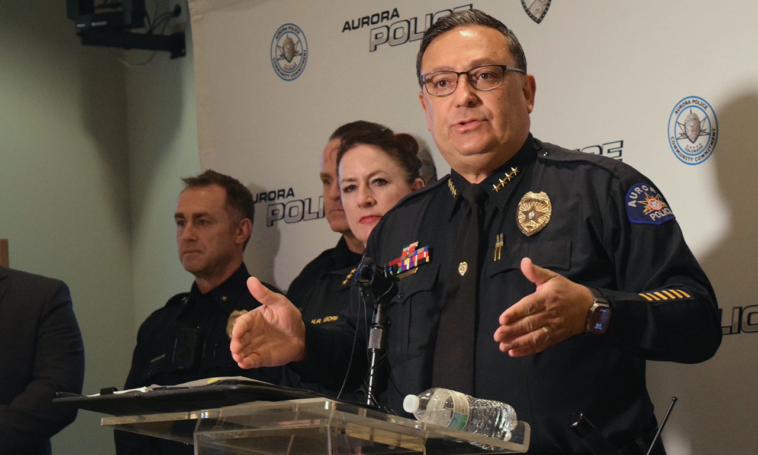Aurora Police Chief Acknowledges Failures in Elijah McClain Case. Aurora police are rewriting Elijah McClain’s death account. On Thursday, Aurora Interim Chief Art Acevedo told reporters that some officers were too “hands-on” in McClain’s death. “We don’t want our officers to go hands-on so quickly, unless there’s an actual threat,” Acevedo said during the news conference.
The department initially exonerated the policemen. After McClain died in 2019, former Aurora Police Chief Nick Metz told reporters, “I think the officers did well calming Elijah.”
Chief Acevedo addressed McClain’s mother at the press conference.
Acevedo stated, “We failed Elijah McClain as a department, his mother Sheneen, and our community.”
“We also failed the officers that encountered him that night,” Acevedo said. “…They failed because they thought, ‘You ask someone to do something, you tell someone to do something and then you make someone do something.’ In the case of Elijah McClain, we went from ‘asking’ to ‘telling’ to ‘making’ swiftly. We should not force someone to do something unless there is an immediate threat. This is tragic.”
“Acevedo said police-suspect communication would prevent this from happening again. “There’s going to be a lot more talking,” he remarked. “Consensual contact, right? We will debate it, talk to him, and then instruct our guys to go back in the car and leave or watch the person if we don’t have legal grounds to detain.”
The recognition of the need for better communication and de-escalation shows a commitment to a more nuanced and constrained police approach. Acevedo’s emphasis on consensual contact and legal justification for detention indicates a change toward respecting individual rights and establishing safer police enforcement-community relations.
In an update, Aurora Police Officer Randy Roedema, convicted of killing Elijah McClain, was sentenced to 14 months in prison, less than half of the term prosecutors wanted. This sentencing raises questions regarding the sufficiency of sanctions for officers implicated in such crimes and police accountability.
The case gained national prominence amid a clamor for justice reform after George Floyd’s death. The recent guilty conviction for Roedema and Chief Acevedo’s admission of errors may mark a turning point in police tactics and accountability.
As the legal proceedings continue, Elijah McClain’s death challenges law enforcement agencies globally to examine their delicate circumstance management and highlights the need for structural improvements in policing. The community seeks updates and is vigilant for Elijah McClain’s justice.
The Chief’s statement is a profound admission that transcends a single case and addresses law enforcement structural challenges. He admits his mistake which raises issues about Aurora Police Department culture and training as well as Elijah McClain’s case.
We must examine Elijah McClain’s death to comprehend this failure. His 2019 police interaction escalated and killed him. The initial exoneration of the cops and Chief Acevedo’s admission of failure show the difficulties of police accountability.
Chief Acevedo’s dedication to improving communication and de-escalation is commendable. Consensual touch and force reevaluation indicate a need for a major police tactics change. Respecting the rights and humanity of police encounterees is now part of police reform discourse beyond the Elijah McClain case.
The case is further complicated by Officer Randy Roedema’s 14-month prison sentence, which was less than prosecutors wanted. It raises questions about police accountability in the criminal justice system and the appropriateness of consequences for deadly instances.
As court processes progress, public scrutiny increases. Advocates for law enforcement reform have focused on the Elijah McClain case. It has raised questions about race in policing and the need to rethink protocols to prevent future deaths.
Chief Acevedo’s admission of failure is part of a bigger call for law enforcement accountability and openness. Community vigilance and demand for Elijah McClain’s justice demonstrate the resilience of collective voices seeking change.
In conclusion, Elijah McClain’s case exemplifies law enforcement’s issues. Chief Acevedo’s acknowledgment of failure and current legal processes highlight the need for fundamental reforms. In the aftermath, Elijah McClain’s legacy inspires systemic policing reform.
REAS ALSO
- Paramedics found guilty in the death of Colorado’s Elijah McClain
-
Prosecutors want to display improved bodycam footage of Elijah McClain’s deadly police confrontation




Join the Community and Be a Part of the Conversation
You must be logged in or registered to post a comment.